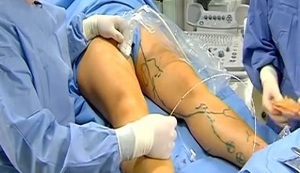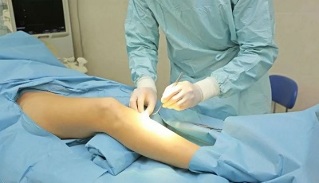
Quick access to a phlebologist with varicose veins develops is the main reason that it is too late to act on the disease with ointments or gels. Doctors should prescribe more effective treatment, among the most effective is surgery for varicose veins in the legs.
Do not forget that even the removal of the affected vessel does not guarantee complete healing - the disease can spread to healthy tissues.
Phlebologist - why contact him
Who should be contacted if there is a suspicion of varicose veins? One can not wait for the spread of the disease, of course the first symptoms should be the main reason to seek medical help. Only a phlebologist can confirm or reject a diagnosis, and should be contacted first. Only he, if necessary, can refer to another specialist.
For what symptoms should you immediately see a phlebologist? Not many of them:
- bright vascular stars appear in the lower limbs;
- weight in the legs, which is usually accompanied by severe swelling;
- seizures, most often disturbing at night;
- skin discoloration, it becomes darker and unnatural.
If you do not rush to the hospital, the disease will start to develop quickly, the spider veins will start to grow and protrude on the skin. The only treatment option in such cases is surgery for varicose veins on the legs, which will be prescribed by a phlebologist after a thorough examination.
What types of foot surgery can a phlebologist prescribe
Surgical treatment may be prescribed depending on the degree of vascular damage. Only a phlebologist can determine which disease removal method is needed, but this requires a number of studies.
Types of foot surgery:
- Miniflebectomy. It is performed with a small vascular lesion. During the operation, the doctor makes a puncture, in which the vein is removed. After the procedure, a small deformity remains in the lower part of the foot, which is almost invisible.
- Phlebectomy. The most common, but also the most traumatic for the skin, surgery, which leaves scars. The surgeon made a long incision where he removed the vessel affected by the disease. Recovery is imminent - the next day the patient can return home.
- Short stripping. The incision was not made - the surgeon made several punctures in which only the injured part of the vessel was removed.
- Sclerotherapy. A special substance is injected into the affected vessel, it attaches to the destroyed tissue. There is no postoperative period at all - the patient can return immediately after the procedure.
- Endovenous freezing. Exposure to laser-affected veins is the safest and fastest method of treatment. Efficiency and pain are the main advantages of treatment.
Surgery for varicose veins on the legs is the most extreme treatment option, although in most cases it turns out to be the most effective.
Laser Varicose Vein Surgery
New methods in medicine make it possible to remove vessels that hit the lower extremities practically without pain and with minor injuries. Laser surgery for varicose veins is an excellent alternative to surgical treatment.
When is endogenous coagulation shown? There are not many reasons for such surgery, and not all respond to local treatments or pills:
- varicose veins, in which large and vital vessels for survival are affected;
- heavy and swollen lower extremities that do not respond to other treatments;
- trophic changes are found in the skin;
- The lower limbs are covered with boils, which are not exposed to topical medications.
How does the operation work? The surgeon makes an incision in front of the affected vessel and inserts a special probe with a laser tip. The laser attaches to the affected vessel area, after which the next incision is made and vein recovery continues.
Laser treatment - what are the advantages of the method over other operations
Although there are many types of surgery for varicose veins, it is this laser effect that has gained popularity among patients. An important role is played here by the low cost of the procedure, but more often the victims of the disease are attracted to the absence of pain during surgery and efficiency.

Laser treatment has many advantages that also attract patients:
- immediately after the operation, you can go home and start your daily activities;
- the procedure is performed under local anesthesia;
- no effect on the skin;
- the procedure is performed in just a few hours;
- does not need to recover from surgery;
- there is absolutely no risk of bruising or bleeding;
- the procedure has no contraindications.
Before surgery, you should undergo a special study that will help determine exactly that there are no other treatment options. During additional examination, it will also be revealed whether there are contraindications, and whether laser surgery will cause complications or side effects.
Consequences that may arise after surgery
Although the operation, even if the chosen method is successful, there is no guarantee that unpleasant and unexpected consequences will not arise. Often, especially if surgical intervention is used, scars can still last a lifetime. To prevent this, you can find out in advance with a doctor of medicine or traditional medicine that promotes healing and prevents scarring.
Another consequence that can occur after surgery is recurrence of the disease. Even if the procedure is successful, doctors cannot guarantee that healthy tissue will not be affected by the disease. Of course, this will not happen immediately, but it is better to monitor the condition of the vessel carefully and at the first signs of damage immediately see a doctor.
You can ask your doctor about how to avoid unpleasant consequences immediately after surgery. Phlebologists should not only tell in detail what measures will serve as prevention, but also to recommend medicines or folk remedies that can be used at home to prevent relapse.
Recovery - what you need to do to avoid postoperative complications
Only after certain types of surgery may recovery be required, and this period has its own characteristics. The needs and rules that the patient must follow are determined by the specialist separately, individually.
Often, during the recovery period, medical underwear is prescribed, which helps to strengthen the vessel wall where surgery is performed. The class and type of compression socks are only prescribed by the doctor, this should not be done independently in any case - a mistake in the choice threatens to recur the disease. The duration of wearing medical underwear is also determined by the phlebologist - for some patients, a few weeks is enough, for others, with complications, they should wear a jersey for a longer period of time.
Another stage of recovery is taking a special medication that restores blood flow to the duct undergoing surgery. Medications are only prescribed by a phlebologist, and many of these medications have many contraindications that must be carefully examined before taking.
Surgery for varicose veins on the legs is the only way to get rid of progressive disease. You should not be afraid to see a doctor if the disease develops rapidly and is incurable, which affects healthy tissue - if you do not stop the disease immediately, even surgery may be helpless.




































